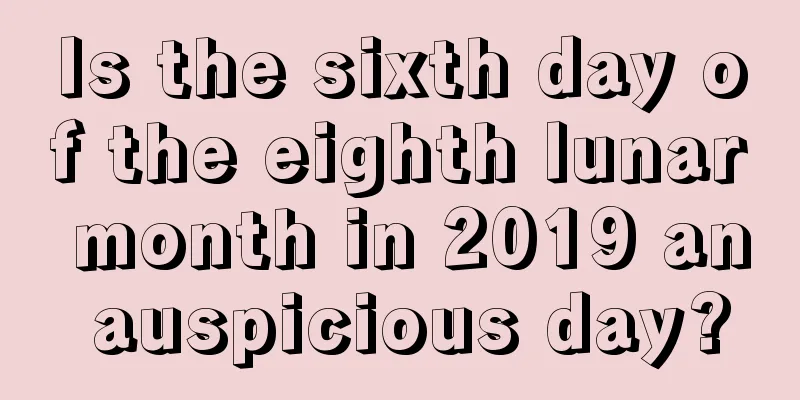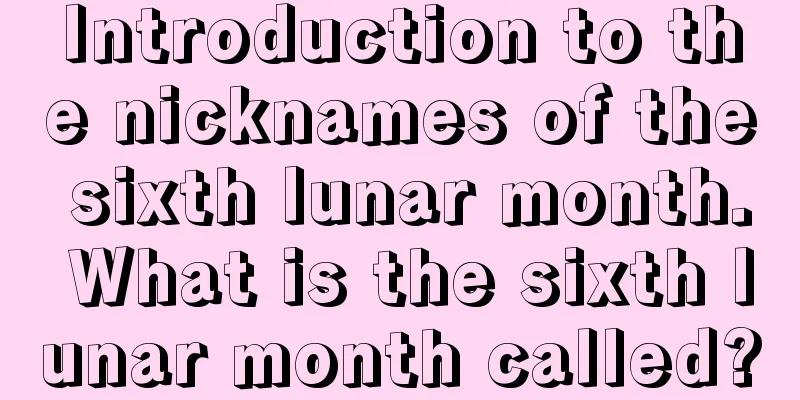A national carnival: how ethnic minorities celebrate the Lantern Festival

Introduction: Our country has a large population and a vast territory. It is a unified multi-ethnic country. There are 56 ethnic groups in my country, including 55 ethnic minorities. The Lantern Festival is one of my country's traditional festivals, and some ethnic minority compatriots also celebrate the Lantern Festival. Next, please follow the editor to learn how ethnic minorities celebrate the Lantern Festival! During the first month of the lunar calendar, you will have a good year. The first month is the most important month of spring. Mr. Shui Mo will share with you some knowledge about January. Yuanxiao originally meant "the night of the Lantern Festival". Because the main activity of the Lantern Festival on the fifteenth day of the first lunar month is eating glutinous rice balls and admiring the moon at night, the name of the festival later evolved into "Lantern Festival". The celebrations that began on New Year’s Eve will be brought to another climax. On the night of the Lantern Festival, the streets and alleys are decorated with lights, and people admire the lanterns, guess lantern riddles, and eat Lantern Festival dumplings, which has become a custom passed down from generation to generation. The Lantern Festival is a traditional Chinese festival that has existed as early as the Qin Dynasty more than 2,000 years ago. According to historical records and folk legends, the fifteenth day of the first lunar month was already taken seriously in the Western Han Dynasty. Emperor Wu of Han held a ceremony to offer sacrifices to "Taiyi" (Taiyi: the god who dominates everything in the universe) in Ganquan Palace on the first night of the first lunar month, which was regarded by later generations as a precursor to the worship of gods in heaven on the fifteenth day of the first lunar month.Customs of ethnic minorities celebrating the Lantern FestivalLike the Han people, some ethnic minorities also celebrate the Lantern Festival, including the Manchu, Korean, Hezhe, Mongolian, Daur, Ewenki, Oroqen, Bai, Xibe, Tibetan, Naxi, Yao, She, Buyi, Zhuang, Li and Gelao.ManchuLike the Han people, the Manchus also have the custom of hanging lanterns and eating Yuanxiao during the Lantern Festival.Bai NationalityThe Bai people in Dali attach great importance to the Lantern Festival. On the fifteenth day of the first lunar month, they often perform dragon and lion dances and organize a "Golden Flower Song and Dance Troupe" to celebrate the Lantern Festival. The lantern and Lantern Festival singing in Dali's Midu County is even more lively, allowing people to fully appreciate the infinite charm of Yunnan folk culture. "Nowadays, the Lantern Festival in Dali is usually celebrated by the Bai, Yi and Han people together, without any distinction between them."MiaoThe Stealing Vegetables Festival, which is popular among the Miao ethnic group in Huangping, Guizhou Province, is also held on the fifteenth day of the first lunar month every year. On the festival day, girls would go in groups to steal vegetables from other people's homes. They were strictly forbidden to steal from their own family or from their same-sex friends' homes, because stealing vegetables was related to their marriage. The stolen vegetables were only cabbages, and the quantity was enough for everyone to have a meal. There is no need to worry about being discovered when stealing vegetables, and the people whose vegetables are stolen from will not blame you. Everyone gathered the stolen vegetables together and made a cabbage banquet. It is said that whoever eats the most will marry his or her ideal partner sooner, and at the same time, the silkworms he or she raises will be the strongest and produce the best and most silk.Yi NationalityThe Yi ethnic group’s traditional festival, the Bau Festival, is held on the fifteenth day of the first lunar month. "Bawu" means "returning from hunting." It is found in the residential area of the Heihuo people, a branch of the Yi ethnic group in Heqing, Yunnan. This festival was originally a customary activity to celebrate the return from hunting, and there was no fixed holiday.Summary: The above article provides us with a detailed analysis of the interesting customs and activities of ethnic minorities in celebrating the Lantern Festival, which are full of ethnic characteristics. You can learn about them and feel the charm of different ethnic cultures! After reading this article, there are more exciting contents in the special topic of the first month of the lunar calendar. Let’s take a look! |
<<: The longest Lantern Festival is here! Let you experience the Lantern Festival customs in Putian
>>: Happy Lantern Festival-Taiwan's Lantern Festival customs
Recommend
Analysis of the fate of boys born in the first month of the lunar calendar. Are boys born on the Lantern Festival good?
Whether a boy's fate is good or not is related...
What day is November 29th in the lunar calendar 2017? What month and date is it?
Winter months are cold, but when everything goes ...
Detailed explanation of the auspiciousness and inauspiciousness of the 14th hour of November 2019
Detailed explanation of the auspicious and inausp...
What kind of fish should be kept in the fish tank at home to protect the house and bring wealth
Introduction: Fish has always had auspicious mean...
Is the tenth day of the eighth lunar month in 2019, Bailu, a good day? Is Bailu an auspicious day for moving to a new house in 2019?
Introduction: Bailu is one of the 24 solar terms, ...
Is it a good time to propose marriage on the ninth day of the second lunar month in 2022? Is it an auspicious day to propose marriage?
Proposing marriage at different times has differen...
Is it not suitable to go back to my parents' home in 2019 when there is heavy snow? When will the heavy snow occur in 2019?
Introduction: Sometimes you have to choose an ausp...
Is August 14th of the lunar calendar in 2020 an auspicious day? Is it a suitable day to open a new store?
The eighth month of the lunar calendar is halfway...
When and what time is Minor Cold in 2021? What can’t Xiaohan do?
Minor Cold is the 23rd solar term in the 24 solar ...
May 26, 2020 is the fourth day of the fourth month of the lunar calendar. Is it a good time for shops and companies to open for business?
The day of opening is a very important Feng Shui ...
How about April 20th of the lunar calendar in 2021? What constellation is it on this day?
In April, the branches are full of locust flowers,...
Is the twelfth day of April in the leap lunar calendar of 2020 a good day? Is today an auspicious day?
Introduction: Every day will have good and bad luc...
When is the Autumnal Equinox in 2020? Is it a good time to get married on the Autumnal Equinox in 2020?
Introduction: The start time of the autumnal equin...
Query the position of the God of Happiness on the sixth day of the sixth lunar month in 2019
The sixth month of the lunar calendar is also kno...
What is the Mid-Autumn Festival? Is it okay to get the marriage certificate one day after the Mid-Autumn Festival in 2020?
Introduction: Different festivals have different m...









